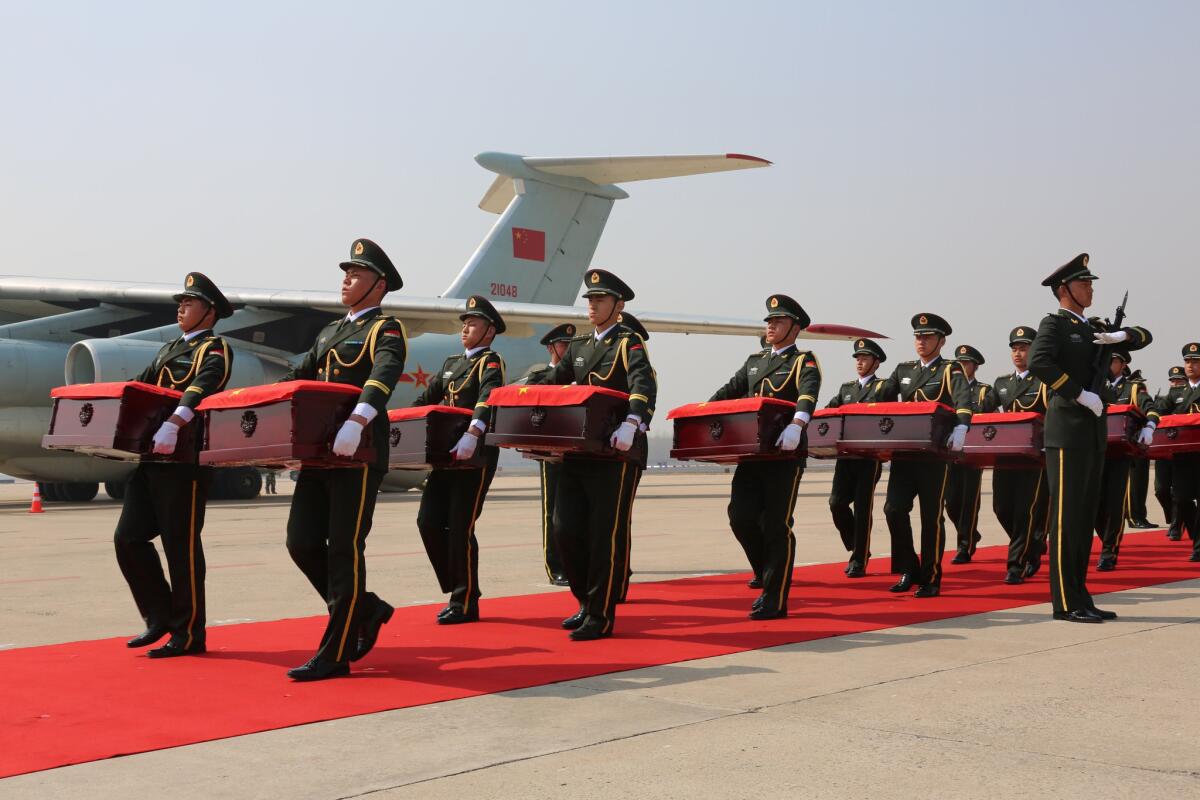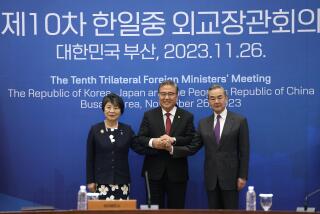Will meeting of China, Japan and South Korea yield goodwill or more grumbling?

- Share via
Reporting from Beijing — For the first time in nearly three years, the foreign ministers of China, South Korea and Japan will meet Saturday for trilateral talks that could pave the way for a new era of cooperation – or prolong festering animosities rooted in the World War II era.
South Korean Foreign Minister Yun Byung-se will host his Chinese and Japanese counterparts, Wang Yi and Fumio Kishida, in Seoul for the discussions, which were last held in 2012.
The meeting is seen as a possible prelude to a three-way summit between leaders of the countries later this year. Chinese President Xi Jinping and Japanese Prime Minister Shinzo Abe met briefly on the sidelines of the APEC world leaders’ gathering in Beijing in November, but have never had a bilateral summit since they both came to power in 2012. Nor has Abe had a summit with South Korean President Park Geun-hye. Park and Xi, however, have met repeatedly, and warmly.
The 70th anniversary of the war’s end will be marked this summer in Asia with a variety of high-profile events, including a military parade in Beijing. Seven decades since Tokyo’s surrender, Japan, South Korea and China have strong economic ties, but deep strains remain, inhibiting collaboration on a range of matters including maritime issues and North Korea.
Frostiness between South Korea and Japan – both U.S. allies – and closer relations between South Korea and China have complicated Washington’s diplomacy in the region amid China’s continuing rise.
South Korea and China contend that Abe and other conservatives in Japan have cast doubt on the sincerity of Tokyo’s past apologies for wartime aggression by, among other things, visiting a shrine honoring war criminals. Japan’s Foreign Ministry and some Japanese academics have also sought in recent months to persuade an American textbook publisher to remove paragraphs on wartime sex slaves used by Japanese soldiers.
At the same time, leaders in China and South Korea often see an advantage to stirring up nationalist, anti-Japan sentiments at home as a way of shoring up political support. Blatant anti-Japanese propaganda appears regularly in state-run media in China, for instance. And conflicting claims to uninhabited islands have also marred relations between Tokyo, Beijing and Seoul.
Whether the three nations now have the will to break their cycle of recriminations and defensiveness remains to be seen. World leaders who include German Chancellor Angela Merkel and U.N. Secretary General Ban Ki-moon have been urging all three countries in recent weeks to forge a new path.
During a speech in Tokyo last week marking the 70th anniversary of the United Nations, Ban said lack of genuine reconciliation between the three countries is a “missing link” that undermines peace and stability in East Asia.
“The United Nations has been engaging in a number of regional cooperative mechanisms but Northeast Asia still remains a missing link,” said Ban, a career South Korean diplomat. “I sincerely hope that the dialogue between countries in the region, in particular Japan, China and the Republic of Korea, will proceed in a forward-looking manner.”
“We must lay the ground for genuine reconciliation, harmony, peace and prosperity,” he added. “In this context, I would urge the leaders in the region to be future-oriented, remembering the past.”
Merkel also struck a similar tone visiting Japan this month. Germany, she said, had been able to reconcile with its wartime enemies because it “faced its past squarely” and there was “the acceptance in Germany to call things by their name.”
However, she noted, its neighbors, such as France, also acted with sincerity. “Without big gestures by our neighbors, that [reconciliation] would not have been possible,” she said.
South Korea and China will be closely watching what words Abe uses to mark the anniversary of the war’s end. He has enlisted a committee to help him craft his remarks. Japan’s Kyodo News Service, quoting unnamed sources, reported this week that China had asked to examine the statement in advance.
It was unclear how directly the three foreign ministers would discuss such historical issues this weekend.
Contemporary issues may provide a more fruitful opportunity for confidence-building. China is attempting to recruit other countries for a new Asian Infrastructure Investment Bank, and has already enlisted more than two dozen countries as founding members of the new institution, which some observers see as a rival to the U.S.-led World Bank.
Ignoring U.S. concerns, American allies such as Britain, Germany and France have said they will participate. A South Korean move to follow suit would be a diplomatic feather in Beijing’s cap as it hopes to get final commitments by March 31.
Under Xi, China has prioritized relations with South Korea while holding traditional ally North Korea at a greater distance – at least publicly. But tensions remain, including the possible deployment of a U.S.-led missile system in South Korea.
Analysts say Seoul is looking for a way to balance its traditional alliance with the U.S. with its increasingly important relationship with China.
“Seoul seeks to placate China on deploying the U.S. missile defense system … by committing itself to be a founding member of the Beijing-led Asia Infrastructure Investment Bank,” said Sung Yoon Lee, an assistant professor at the Fletcher School of international affairs at Tufts University.
The missile system, known as Terminal High-Altitude Area Defense, or THAAD, intercepts incoming missiles. “It is aimed exclusively at dealing with the threat posed by North Korea and it happens to be a good system,” Deputy U.S. Secretary of State Antony Blinken said during a visit to Seoul last month. He said at the time the U.S. and South Korea were not actively discussing the deployment of THAAD.
But this week, South Korean media reported that the U.S. had designated sites in the country from which THAAD could be deployed in cases of emergency. That prompted China to, without mentioning South Korea by name, say it hoped “certain countries can be prudent” and “take into account others’ security concerns.”
Where Tokyo might find common ground with Seoul or Beijing at this weekend’s meeting remained less clear; a source close to the Japanese delegation mentioned areas such as disaster management, the environment, tourism and education as possible arenas for cooperation. China and Japan this week also resumed a security dialogue in Tokyo.
Analysts said diplomats had to start somewhere. “With so much at stake for the leaders of Korea, Japan and China in this year,” said Lee, “it behooves their respective foreign ministers to pave the way for diplomatic progress.”
Borowiec is a special correspondent.
Makinen reported from Beijing and Borowiec reported from Seoul.
Follow @JulieMakLAT for news from Asia
More to Read
Sign up for Essential California
The most important California stories and recommendations in your inbox every morning.
You may occasionally receive promotional content from the Los Angeles Times.











